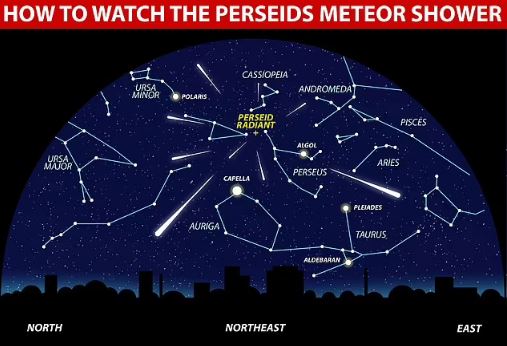August is truly a wonderful month because tonight, the midnight blue of the sky will be lit up as shooting stars crash through it.
Tonight, the night sky will be illuminated by the annual Perseid meteor shower, which is widely regarded by astronomers as one of the most spectacular celestial events of the year.
Meteors, often called shooting stars, come from comet debris and fragments of shattered asteroids. When comets make their orbits around the sun, the dust that they expel gradually forms a dusty trail that follows them on their journeys.
The Earth travels through some of these debris trails once every year, which enables the particles to collide with our atmosphere and disintegrate there, creating blazing and colorful streaks in the sky that many people find to be incredibly beautiful.
The Perseid meteor shower, also known as the “fiery tears of Saint Lawrence,” will be visible in the sky overnight tonight (August 12) if the sky remains clear and continue streaking overhead until daybreak on Saturday (August 13), with the most visibility in the Northern Hemisphere.
According to the Royal Observatory Greenwich, there could be as many as 150 shooting stars every hour!
The magical celestial event takes place once a year as the Earth travels through the debris that was left behind by the Swift-Tuttle Comet.
The Swift–Tuttle Comet, which is responsible for the Perseid meteor shower, has a width of 16 miles and is composed of ice and rock. Once every 133 years, having made its most recent passage in 1992, it travels through our Solar System.
NASA has long considered the Perseid meteor shower to be “the best meteor shower of the year” with many “swift and bright meteors.”
Skies across a large portion of the U.S. and U.K. are forecast to be clear tonight, making for perfect viewing conditions.
How To Watch The Perseids Meteor Shower

The 24th largest constellation in the sky, Perseus, is where these meteors appear to emerge from, hence the name “Perseids meteor shower.”
Stargazers need to look northeast to locate Perseus, thought to resemble the Greek hero Perseus raising a sword above his head, can be found in the northeast.
“The bright moon may also make viewing the meteor shower a little more difficult at times,” the UK’s Met Office spokesperson said.
To get the full effect of the shower, try to get to a place which is far from the flaring lights of the city. Take a comfy blanket to lie down on and switch off all your devices.
In less than half an hour your eyes will have adjusted to the dark and you’ll be perfectly set to watch nature’s own fireworks.
While you can take a telescope or pair of binoculars with you, they won’t really help because they only offer a restricted view of the night sky.
Have fun watching the skies!
Now, you can follow Conscious Reminder on Facebook & Instagram!
∼If you like our article, give Conscious Reminder a thumbs up, and help us spread LOVE & LIGHT!∼
